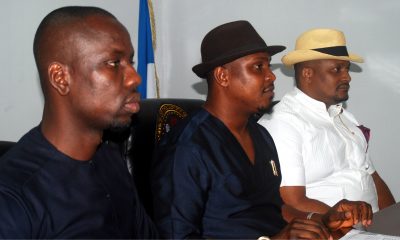Politics
Imperative Of Transcendent Minds

Jason Osai
The ability of rational thought is not an all-comers game; it requires stretching the mind beyond the reaches of general precepts and the usual perceptions that anchor lesser minds on mundane issues such as materialism, ethnicity or the neurotic preoccupation with the preposterous and idiotic matter of searching for the face of the Unknowable through the jaded and ossified creeds of institutional religion; the transcendent mind is neither Jew, Buddhist, Traditionalist, Christian nor Moslem. Transcendence of the mind, in this regard, implies the ability to see beyond the tiny little pictures and philosophies that constitute divisive hedgerows in humanity; the transcendent mind sees and savors the essence of the larger picture. In management and administration, transcendence requires embracing the concept of formalistic impersonality and being conscious of halo effect. In political leadership, transcendence calls for objectivity, sensitivity and decisiveness devoid of sentiments, sectionalism and all the other isms that create divisions and cause disaffection and conflict in human society. This piece focuses on the decisions and actions of two governors (one from the South and the other from the North), the averments of a consultant physician of Fulani extraction and a foremost Traditional Ruler from the North.
In very unequivocal terms, Governor Nyesom Wike of Rivers State declined to provide land for RUGA arguing that the land he has is earmarked for agriculture. Couching his position in comical cynicism, Wike offered to give the Federal Government access to the seawaters of Rivers State for them to pipe water to RUGA settlements in the North just as they piped oil and gas there; this is an obvious reaction to the violence and insecurity perpetrated by herdsmen in the State in recent times and an eloquent expression of the resolve to protect Rivers people; that it was not a campaign speech demonstrated its patriotic root. In what seems a volte-face from the patriotism expressed in regard the RUGA uproar, Governor Wike appointed HRH Justice Sidi Bage Mohammed 1, JSC Rtd CON, Emir of Lafian Barebari and Chairman Nasarawa State Council of Chiefs, as Chancellor of Rivers State University. While the first decision painted a picture of vanguard of the people of Rivers State, the nationalist in Wike crystalized from the later decision; taken together, the two decisions clearly indicate a desire to maintain the corporate existence of Nigeria as a nation without compromising the interest and safety of Rivers people; they attest to the objectivity of Governor Wike and transcendence above interparty, interreligious and ethnocentric bickering.
On Nija.com Legit (July 16, 2019), Jerrywright Ukwu reports that Governor Alhaji Yahaya Bello of Kogi State broke a twenty-eight year old jinx by building a chapel in Government House, Lokoja; said Governor Bello: “Religion is a matter of faith, of belief, not evidence, and if we do not have respect for the beliefs of others, it’s to our detriment, since a lack of respect diminishes us as human beings. So, I am shocked as to why my predecessors never bothered to build a chapel for Christians even when there is a mosque here.” Stating that “Religion is a matter of faith, of belief, not evidence” indicates that Governor Bello realizes that religion is imaginary and based on conjectural anecdotes and narratives. Again, to have said that “if we do not have respect for the beliefs of others, it’s to our detriment, since a lack of respect diminishes us as human beings” indicates that Bello is a Moslem in the true sense of Islam being a religion of peace; this means that he is beyond the fanaticism of extremism as instigated by some radical Moslem clerics. These eloquently speak to the transcendence of his mind, which reflects the desire for harmony in humanity.
Reacting to the RUGA palaver, Dr. Nura Alkali, a Fulani and consultant physician at Ahmadu Bello University, Zaria, opined that “only the blind will insist on living a 17th Century life in 2018. Fifty years ago, humans conquered space to land on the moon. Others decoded DNA, which advanced the science of animal breeding to levels never before imagined in history. But we still have people pursuing an impossible nomadic lifestyle to raise cattle.” This is a lamentation of a way of life that belongs in the distant past of Nigeria.
Reacting to the economically debilitating and pervading social insecurity and the biting undercurrents of ethnocentrism in Nigeria, HRH Sanusi Lamido Sanusi, Emir of Kano and a Fulani, wrote thus: “After the First World War (WWI), the victors treated Germany with the same contempt Nigeria is treating Igbo. Two decades [after the WWI], there was a Second World War (WWII), far costlier than the first. Germany was again defeated, but this time, they won a more honorable peace. Our present political leaders have no sense of history. There is a new Igbo man, who was not born in 1966 and neither knows nor cares about Nzeogwu and Ojukwu. There are Igbo men on the streets who were never Biafrans. They were born Nigerian; are Nigerians but suffer because of actions of earlier generations. They will soon decide that it is better to fight their own war, and maybe find an honorable peace, than to remain in this contemptible state in perpetuity. The Northern Bourgeoisie and the Yoruba Bourgeoisie have exacted their pound of flesh from the Igbo. For one Sardauna, one Tafawa Balewa, one Akintola and one Okotie-Eboh, hundreds of thousands have died and suffered. If this issue is not addressed immediately, no conference will solve Nigeria’s problems.” This clearly indicates fervent patriotism, strong sense of history and the realization of the fact that history has the uncanny capacity of being repeated by those who fail to learn its lessons. Sanusi’s averment transcends the wrangling amongst the major ethnic groups and myriad of minority groups across the Nigerian ethno-cultural space, where virulent ethnocentric vituperations and disintegrative nationalism are the order of the day and constitute the new norm.
Until the process of selecting leadership in Nigeria encourages and accommodates the emergence of patriotic, objective and decisive people in public office, the nagging issue of rudderlessness and lackluster performance in the public sector will persist to the detriment of the Nigerian society. Here, it is a collective responsibility; both the leader and the led share in the phenomenon. As the saying goes “a people deserve the leadership they get.”
Osai is a lecturer in Rivers State University, Port Harcourt.
Politics
LP Crisis: Ex-NWC Member Dumps Dumps Abure Faction
Mr Ojukwu, who recently returned to the interim National Working Committee led by Senator Esther Nenadi Usman, noted that the party had 34 elected members in the House of Representatives, eight Senators, and 80 members at the state Houses of Assembly after the 2023 general elections.
“Now we lost all of them,” he said. “I don’t think we have as many as five members in the National Assembly.”
The former national officer of the LP talked to journalists in Abuja and said he chose to join the caretaker committee led by Senator Nenadi-Usman because they are now the officially recognized leaders of the Party.
“I chose to work with the caretaker committee to help save the Labour Party, for the benefit of the party. I also want to use this chance to ask my colleagues at the national, state, and local government levels to come together and help rebuild our party.
“Another election is around the corner. We lost everything we have. They have left to other political parties. So I’ll reach out to all my friends in the other group to get together and work on making this party stronger again.
“The caretaker committee has formed a reconciliation committee. Let’s come together and talk so that we can restore the first opposition political party in Nigeria.”
Mr Ojukwu, who was part of the Julius Abure’s group, said there are no more factions in the LP.
He added, “There is a court ruling, and since it is valid, the right people are in the correct positions.”
He urged Barr Abure and others to drop the legal cases they have filed because they are not helping the party.
“Litigations are killing political parties”, he said. “They’ve seen many political parties disappear because of legal battles, and the Labor Party is losing support every day, which makes me feel sad.”
Mr Ojukwu said he did not think joining the Senator Nenadi-Usman’s NWC was a betrayal of the Abure group, describing himself as “the oxygen” of that faction.
“I’m with this group because of the verdict. But I never betrayed anybody. Rather, I was betrayed,” he added.
Politics
2027: NIGERIANS FAULT INEC ON DIGITAL MEMBERSHIP REGISTER DIRECTIVE
Politics
IT’S A LIE, G-5 GOVS DIDN’T WIN ELECTION FOR TINUBU – SOWUNMI
-
Politics2 days ago
2027: NIGERIANS FAULT INEC ON DIGITAL MEMBERSHIP REGISTER DIRECTIVE
-

 Environment2 days ago
Environment2 days agoLAWMA Director Says Sweeping Reforms Have Improved Waste Collection
-
Politics2 days ago
LP Crisis: Ex-NWC Member Dumps Dumps Abure Faction
-

 Politics2 days ago
Politics2 days agoUmahi Dismisses Allegations On Social Media, Insists On Projects Delivery
-

 Sports2 days ago
Sports2 days agoAbia Not Sure To Secure continental Ticket
-
Sports2 days ago
La Liga: Yamal Records First Career Hat-trick
-

 Sports2 days ago
Sports2 days agoCity Survive Leeds’ Challenge At Elland Road
-
Politics2 days ago
IT’S A LIE, G-5 GOVS DIDN’T WIN ELECTION FOR TINUBU – SOWUNMI





